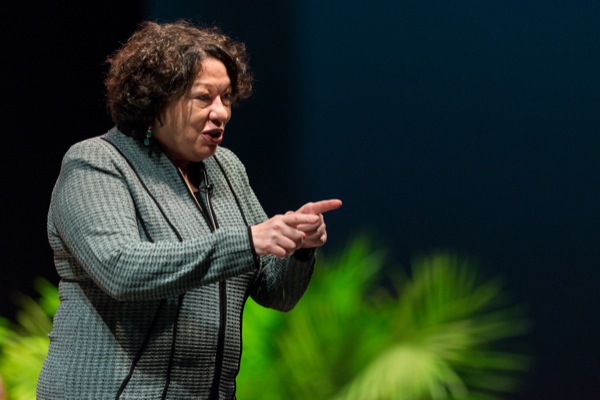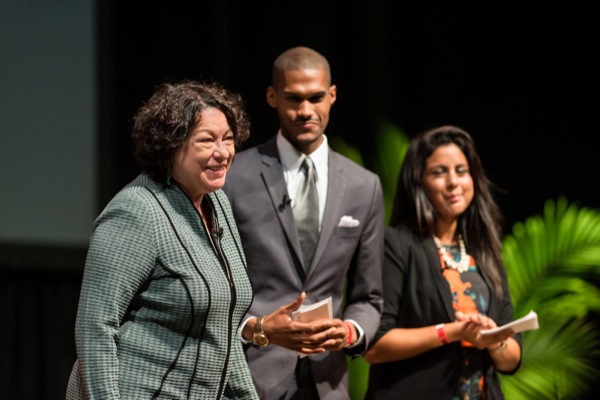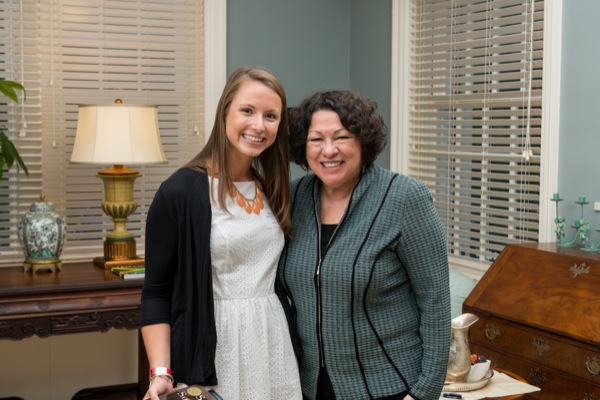First Year Common Reader
Supreme Court Justice Sotomayor shares life's lessons with Class of 2017
3:05 p.m., Sept. 20, 2013--From the moment she walked onto the stage to a standing ovation from an appreciative audience at the University of Delaware, U.S. Supreme Court Justice Sonia Sotomayor connected with UD’s newest students, urging them not to forget what it is to be human.
Speaking to an audience of more than 2,000 -- including many from the University’s Class of 2017 -- at the Bob Carpenter Center on Thursday, Sept. 20, Justice Sotomayor shared the experiences of her early life as chronicled in her memoir, My Beloved World.
People Stories
'Resilience Engineering'
Reviresco June run
The presentation was part of the University’s First Year Common Reader program, in which incoming first year students are asked to read a selected work before arriving on campus.
“What this shows is that it has been a very long time since I have been your age,” Justice Sotomayor said. “Some of the things I say today may not resonate with you, but they will someday.”
Foregoing the podium for a more intimate exchange of ideas with her audience, she remarked that a college experience represents a chance to grow individually and to share the results of that learning.
“What will make you a meaningful person in life is to become an interesting person by learning as many new things as you can, every day that you live,” Justice Sotomayor said. “You should use that knowledge in a way that you are giving to people and sharing with people. College is the beginning of the process.”
Besides concentrating on meeting course requirements and planning for the future, the justice suggested that students think about things they don’t know, things they didn’t learn in high school.
“Become interested in any issues you read about and hear about, because it will make you understand the world better,” she said. “Figure out what role these things play in your relationship with other people, both in their environment and yours.”
In quoting British historian Lord Acton’s famous dictum, “Power corrupts, and absolute power corrupts absolutely,” Justice Sotomayor cautioned against overvaluing important sounding titles and positions of prominence because important contributions are being made by people at all levels of society.
“I don’t want to forget that I wasn’t a Supreme Court justice first,” she said. “Writing the book was a really important thing for me to do — to stop and remember who I was.”
In noting that first year students may be overwhelmed by their academic challenges and the drive to compile an impressive early college resume, Justice Sotomayor suggested that students remember those who were a steadying influence and to keep family and friends in their lives.
“One part of my book is about what people gave to me in terms of knowledge and assistance,” she said. “It’s important to learn how to give, and this may be the most difficult thing to do.”
The common drive to become good at anything may also produce a certain amount of ego that clouds a person’s perspective of who they are and what their higher aims are, she said.
“What you are really doing here at UD is learning how to learn,” Justice Sotomayor said. “Take time to share what you do with others. The most fun comes from being a more interesting person.”
Question and answer session
Justice Sotomayor also fielded questions from a panel introduced by University President Patrick Harker that included Margaret Andersen, Edward F. and Elizabeth Goodman Rosenberg Professor of Sociology; N’Kosi Oates, a Ronald E. McNair Research Scholar senior double majoring in political science and communication; and Shylah Duchicela, a senior from Guayaquil, Ecuador, majoring in public policy and sociology with a minor in economics.
When asked about how she handles the heavy workload that comes with being a Supreme Court justice, she said, “Not always well. My friends watched me overextend myself. I’m now 60, and they try to get me to set a better pattern.”
In dealing with pressure, Justice Sotomayor noted that she tries to build some exercise into her life and to complement that with good food and healthy eating.
“I used to dine out but once I became a Supreme Court justice, I felt everybody was looking at me. Now, I have friends over and cook at home,” she said. “I try to spend meaningful time with friends, just walking and talking to another human being. It replenishes my soul.”
As far as personal experiences shaping what she does on the bench of the nation’s highest court, Justice Sotomayor said, “My personal experiences may affect how I look at a case, but they do not drive my answer.”
On dealing with the grief that comes with losing a loved one, she said that cherished memories can offer meaning and comfort during life’s harder moments.
“People should live their lives in a way that keeps them in memory,” Justice Sotomayor said. “For me, I remember that they have left me with something very precious, something that may have saved my life.”
First Year Common Reader essay winners
Five students were awarded prizes in the My Beloved World essay contest sponsored by the First Year Experience program.
The winners are
- Sarah Kate Davidson-Catalano, a University Studies major from Acton, Mass., first place;
- Emily Tucci, an English major from Berwyn, Pa., second place; and
- Matthew Spicer, an engineering-undeclared major from Lewes, Del, third place.
Honorable mention awards were given to:
- Laura Holt, a history major from Moorestown, N.J.; and
- Kaitlyn Thomesen, a statistics major from Cromwell, Conn.
About the First Year Common Reader
The First Year Common Reader program engages incoming students in the intellectual life of the UD community. During the fall semester, a variety of activities and events around the theme of the book will be held on campus.
Previous common readers have included Behind the Beautiful Forevers: Life, Death and Hope in a Mumbai Undercity by Katherine Boo and The Immortal Life of Henrietta Lacks by Rebecca Skloot.
For more information on the common reader and other First Year Experience programs, see the website.
Article by Jerry Rhodes
Photos by Evan Krape














